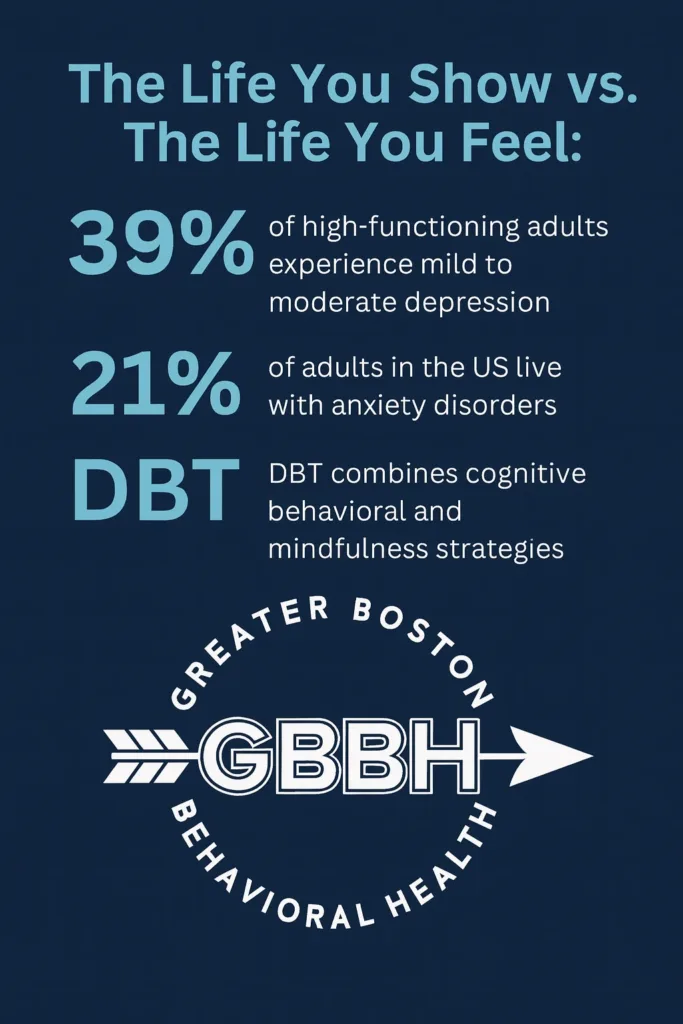From the outside, everything looks stable. Reliable. You go to work. You answer emails. You help your partner clean the kitchen and remember your friend’s birthday. You’re the one people lean on. But what they don’t see—what maybe even you barely admit to yourself—is how much energy it takes to maintain that calm exterior.
Inside, it’s a different story. The overthinking. The emotional spikes. The quiet self-loathing. The coping habits that used to help but now just keep you afloat. You don’t feel “bad enough” to fall apart, but you don’t feel good, either.
And that’s exactly where Dialectical Behavior Therapy (DBT) comes in. DBT isn’t just for crisis. It’s for the in-between. For people like you—high-functioning, successful, and silently struggling.
When “Holding It Together” Is the Whole Problem
There’s a specific kind of burnout that comes from living two lives. The one the world sees, and the one you feel.
You might be performing at a high level—at work, in relationships, in social settings—but beneath the surface, the internal pressure never stops. You’re emotionally white-knuckling your way through days. You self-correct constantly. You manage. You suppress. And then you wonder why you feel numb, detached, or secretly angry all the time.
Many high-functioning individuals carry trauma responses in disguise. Perfectionism. People-pleasing. Chronic over-responsibility. These aren’t personality traits—they’re survival strategies. And they eventually exhaust you.
Why DBT Isn’t Just for Crisis
DBT is often talked about in the context of intense emotional dysregulation or suicidal ideation. And yes, it’s lifesaving for people in those places. But it’s equally powerful for high-functioning individuals whose pain never shows up on the outside.
At Greater Boston Behavioral Health, we offer DBT in Boston, Massachusetts for people who are quietly breaking down behind their accomplishments.
DBT teaches emotional regulation—but more than that, it helps you stop living in extremes. You don’t have to be spiraling out to qualify for support. Being chronically on edge, numb, or emotionally disconnected is reason enough.
Four DBT Skills That Change the Game
The power of DBT lies in its structure. You’re not just talking about feelings. You’re learning concrete, usable skills that help you face them differently.
1. Mindfulness
Learn how to slow down and actually be where you are—without being hijacked by the past or overwhelmed by what’s next. For many high-functioning people, mindfulness is the first moment of real rest they’ve had in years.
2. Distress Tolerance
These tools help you survive intense emotional moments without resorting to self-harming behaviors, unhealthy coping strategies, or impulsive decisions. They offer a pause when everything feels like too much.
3. Emotional Regulation
Feelings don’t have to rule your day—or get shoved aside completely. This DBT skill teaches you how to identify emotions early, understand them, and respond effectively without burning out or exploding.
4. Interpersonal Effectiveness
Being high-functioning often means being overly responsible for others. This skillset helps you express your needs, set boundaries, and protect your energy without guilt or resentment.
“It’s Not Bad Enough” Is the Lie That Keeps You Stuck
Many high-functioning people delay seeking help because they believe their pain “doesn’t count.” If you’re still showing up to work, if your kids are okay, if you’re not visibly in crisis, how could you justify therapy?
But quiet pain is still pain.
If you’re pushing through every day, dreading silence, or noticing habits you’re starting to hide—DBT can help. You don’t have to prove how bad it is. You just have to decide you want different.
Therapy That Matches Your Complexity
At Greater Boston Behavioral Health, we’ve built our DBT program around one core belief: complexity deserves care.
That means no shame, no pressure, and no one-size-fits-all answers. We know that not everyone who walks through our doors is in pieces. Some are just tired of holding it all together. Others are ready to feel something again. And many don’t even know what’s wrong—they just know they’re not okay.
Whether you’re dealing with chronic anxiety, relationship struggles, trauma, or just a lifelong pattern of emotional suppression, we meet you where you are.
You Don’t Have to Live in “Almost”
If you’re high-functioning but unhappy, this might sound familiar:
- “I have everything I’m supposed to want. Why don’t I feel better?”
- “I’m scared if I slow down, everything will fall apart.”
- “I’m exhausted but I don’t know how to stop.”
- “I’m fine. I’m just…not happy.”
That’s the emotional gap DBT speaks to. The space between functioning and feeling. The emotional dissonance of having a life that looks fine—and feels off.
You don’t have to blow up your life to feel better. But you do have to stop pretending it doesn’t hurt. If you’re near Boston, Dedham, Waltham, Needham, or West Roxbury, Massachusetts, GBBH offers programs with that same approach.
FAQ: What You Might Still Be Wondering About DBT
Do I need a diagnosis to start DBT?
No. While DBT was originally designed for people with Borderline Personality Disorder, it’s now used to support many mental health struggles—including anxiety, depression, PTSD, and high-functioning emotional dysregulation. You don’t need a diagnosis to begin.
Is DBT only for people in crisis?
Absolutely not. DBT is powerful in crisis—but it’s also deeply effective for people navigating chronic emotional stress, internalized pressure, or relationship difficulties. Many of our clients are high-functioning professionals or parents who are simply tired of feeling like they’re barely holding on.
How is DBT different from regular talk therapy?
DBT is highly structured. It blends traditional therapy with skill-building and mindfulness training. You’re not just talking—you’re learning how to live, respond, and connect differently. Many high-functioning individuals find DBT more actionable and grounding than general talk therapy.
How long does DBT take to work?
It varies by person. Most people begin to see emotional shifts within a few weeks. However, full DBT programs typically run for several months to ensure you build—and retain—those life-changing skills.
Can I do DBT while working full time?
Yes. We understand the demands of professional and family life. Our DBT services in Boston include flexible scheduling options and a team that respects your time while supporting your healing.
You’re Not Alone—Even If It Feels That Way
High-functioning people often suffer silently. But silence doesn’t make your pain less real. If you’re tired of performing, tired of pretending, or just tired—you deserve support that sees all of you.
Call (888) 450-3097 or visit to learn more about our DBT services in Boston, Massachusetts. The version of you that’s been holding it all together? We see them. And we’re here to help.


